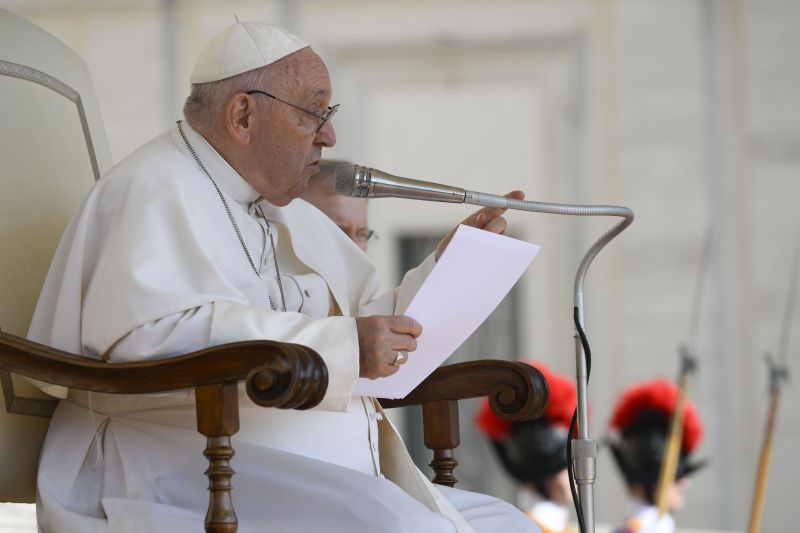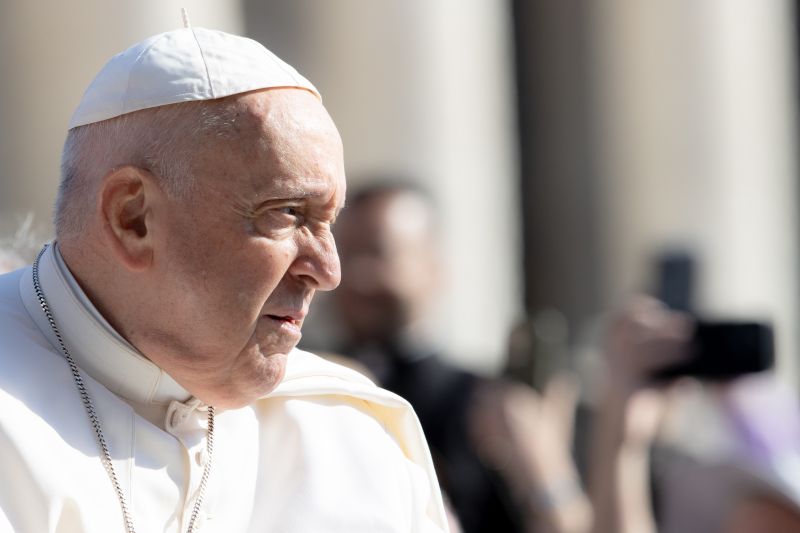 Pope Francis spoke about apostolic zeal and the example of Korean martyr St. Andrew Kim Taegon at the Wednesday general audience in St. Peter’s Square on May 24, 2023. / Vatican Media
Pope Francis spoke about apostolic zeal and the example of Korean martyr St. Andrew Kim Taegon at the Wednesday general audience in St. Peter’s Square on May 24, 2023. / Vatican Media
Vatican City, May 24, 2023 / 05:26 am (CNA).
St. Andrew Kim Taegon and the other Korean martyrs teach us to have courage when sharing the Gospel, even in the face of difficult situations, Pope Francis said on Wednesday.
At his weekly public audience May 24, the pope spoke about the first Korean-born Catholic priest, who was tortured and beheaded near Seoul, South Korea in 1846 at the age of 25.
St. Andrew Kim Taegon was canonized in 1984 with 102 other Korean martyrs.
Pope Francis pointed out that around 200 years ago in Korea, Christianity was severely persecuted.
“At that time, believing in Jesus Christ in Korea meant being ready to bear witness even unto death,” he said.
“No matter how difficult the situation may be — and indeed, at times it may seem to leave no room for the Gospel message — we must not give up and we must not forsake pursuing what is essential in our Christian life, namely evangelization,” the pope said.
He recalled an event from St. Andrew Kim’s life that illustrates the quality of never giving up.
When the Korean Catholic was a seminarian, he needed to find a way to secretly welcome foreign missionary priests to Korea, since foreigners were forbidden from entering the country.
“One time,” Francis said, the saint “walked as the snow was falling, without eating, for so long that he fell to the ground exhausted, risking unconsciousness and freezing.”
“At that point, he suddenly heard a voice, ‘Get up, walk!’ Hearing that voice, Andrew came to his senses, catching a glimpse of something like a shadow of someone guiding him.”
Pope Francis said “this experience of the great Korean witness makes us understand a very important aspect of apostolic zeal; namely, the courage to get back up when one falls.”
The pope shared another example of St. Andrew’s courage in evangelization.
Given the situation at the time, to confirm the Christian identity of others, they would agree ahead of time upon a sign of recognition.
“Then the saint would surreptitiously ask the question, but all quietly: ‘Are you a disciple of Jesus?’” Francis explained. “Since other people were watching the conversation, the saint had to speak in a low voice, saying only a few words, the most essential ones. So, for Andrew Kim, the expression that summed up the whole identity of the Christian was ‘disciple of Christ.’”
As the example of St. Andrew Kim Taegon shows, the pope said, being a disciple of the Lord “means to follow him, to follow his way, and this involves giving one’s life for the Gospel.”
“The Christian is by nature a missionary and a witness, just as Jesus was a missionary and witness to the Father. Every Christian community receives this identity from the Holy Spirit, and so does the whole Church, since the day of Pentecost,” he said.
Pope Francis said seeing the example of these great saints, we might wonder to ourselves how we can evangelize in our own lives.
We can do this in our own, small way, he said, “evangelizing family, evangelizing friends, talking about Jesus, but talking about Jesus and evangelizing with a heart full of joy, full of strength.”
“Let us prepare ourselves,” he added, “to receive the Holy Spirit in the coming Pentecost and ask him for that grace, the grace of apostolic courage, the grace to evangelize, to always carry on the message of Jesus.”
The pope’s catechesis on St. Andrew Kim Taegon was part of a series on apostolic zeal.
The week prior, he highlighted the example of the Jesuit missionary St. Francis Xavier.
[…]






